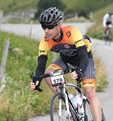Sean warned me. First, the title of his autobiography, although hardly original, is certainly truthful. Added to that was this foreshadowing of things to come in Chapter Two:
"If you want to read about who stuck what needle in whose arm at what race in the back of whose car in 1983 or whenever, then I'm afraid you're reading the wrong book. This is a book about cycling, not about drugs."
Still, I had some hope that Yates would tell us something I either didn't know, or at the very least, wanted to read. I was disappointed for a long time.
The book runs what I think might be considered a standard blueprint for autobiographies, beginning with a chapter in the present (in this case last year's Tour de France, when he was directeur sportif of Bradley Wiggins' victorious Team Sky) before diving back to the beginning - the never-ending beginning. To be fair, this part of autobiographies is usually a struggle for me, but I found Sean Yates' tales of his childhood nearly unbearable. Don't blame him, though. I just didn't care very much. Here's one of God-knows-how-many examples:
"It was this part of the forest that got me in my first serious bit of trouble, when I built a camp out of old wood and dried bracken here. All well and good, until I made the mistake of thinking that what it really needed was a nice little fire. It went up like a straw Guy Fawkes. I raced down the lane back home to get some water, but by the time I got to the house the flames were lighting up the sky and I could hear the fire engines coming up the main road."
Riveting stuff.
The rubber finally starts to hit the road for me when he begins his pro career in Europe, but even there it just seems to be a steady stream of events, leaving me a passive bystander, rather than an involved participant. Again, Sean never promised me deep revelations or thoughtful introspection. There is the occasional interesting anecdote, and plenty of side stories that flesh out this autobiography somewhat, and there is my favorite chapter, written entirely by his ex-wife, Pippa. Kudos to Sean for obviously not fiddling with the final product of this chapter, too, because, although it's clear that she is still devoted to him even after their divorce, my impression of it was of Pippa ripping Sean a new hole in this chapter.
Sean Yates was a great cyclist and one of the hardest working domestiques in the peloton during the 80s and 90s. There are plenty of testimonials to this fact in the book, from the likes of Sean Kelly, Dag Otto and Yohan Bruyneel. He won a stage in the Tour de France and held the Yellow Jersey for a day, as well as a number of smaller victories, all of which are covered in the book, of course, and could be interesting for some to read, I'm sure.
But back to Yohan Bruyneel...there is a great hole in this book, no matter how clear Sean Yates' intentions are. It is just not possible for a cycling fan in 2013 to read an autobiography of a rider who rode and worked with Lance Armstrong (Motorola, Discovery, Astana), was a directeur sportif under Bjarne Riis (CSC, when Tyler Hamilton was riding - and doping - on the team) and Yohan Bruyneel at Discovery, then Astana. It's inconceivable that he didn't know what what was going on and I am not sure he ever says he didn't in the book. He just appears to have decided not to write about it. I understand. If you start down that road then there's probably no stopping. If you out one old friend, then why not all of them? I get it, but even so, it feels like there is one massive missing chapter in this book.
But Yates doesn't shy away from doping altogether. He is still good friends with Armstrong and wonders aloud at the hypocrisy of demonizing Lance, while others who did the same thing get off scot-free. Good point. Richard Virenque is still a star in France and George Hincapie continues to be seen as the George Bailey of the cycling world no matter how many needles went into his arm.
The book winds down with Yates' Sky years and I find myself getting involved. Maybe because I know the cast so much better or maybe because, after nearly 300 pages of constant drumming, I am starting to care about Sean and what happens to him. I find myself glad that the book is finished, but also I'm not disappointed that I read it. It's probably the only kind of autobiography that Sean could write and, with the huge exception of the untold doping story, it seems honestly done.
Still, I'd get the Kindle version, if I were you.
0 Comments






